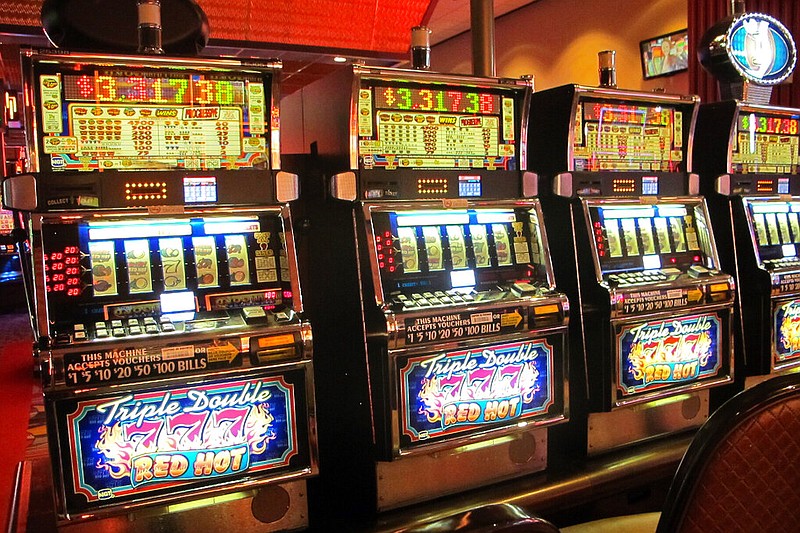The Legislative Council on Friday approved Gov. Asa Hutchinson's request to transfer $200,000 from the rainy-day fund to the Arkansas Racing Commission to fund compulsive gambling treatment and educational programs.
The council's Performance Evaluation and Expenditure Review Subcommittee on Tuesday recommended approval of the Republican governor's request.
Hutchinson asked for the transfer in a letter dated Dec. 2 to Department of Finance and Administration Secretary Larry Walther, who forwarded the request in a letter dated Dec. 3 to the subcommittee's co-chairmen, Sen. Jonathan Dismang, R-Searcy, and Rep. Michelle Gray, R-Melbourne.
The rainy-day fund balance will be $11.1 million after the $200,000 transfer, said finance department spokesman Scott Hardin.
The finance department will work with the Office of State Procurement to determine the best option for securing a company to provide the required services, he said.
Hardin said the finance department does not have a specific time frame to award a contract, but "will work to issue the contract as quickly as possible within the rules."
Asked when the finance department expects the compulsive gambling disorder treatment and educational programs will be operational, he said, "Our initial priority is determining which company can adequately meet the intent of [constitutional] Amendment 100."
Hutchinson's request came after FaNeisha Yavette Mosley of Little Rock filed a lawsuit Dec. 1 in Pulaski County Circuit Court, claiming that the Racing Commission and finance department haven't fulfilled their duty under Amendment 100 to provide at least $200,000 a year for compulsive gambling disorder treatment and educational programs.
Amendment 100 requires the Racing Commission to work with the Department of Human Services to implement the compulsive gambling programs.
In November 2018, voters approved Amendment 100, which authorized the Racing Commission to license four full-fledged casinos, which the commission has done. Three casinos operate in Hot Springs, Pine Bluff and West Memphis, while the licensed casino in Russellville hasn't been constructed yet.
For a few weeks before to the lawsuit, the Arkansas Democrat-Gazette, in preparation for an article, raised questions about the lack of funding for the programs.
When asked whether those questions played a role in the funding decision, Hardin said on Dec. 2, "the need to meet the Amendment 100 requirement has been a priority for us this year.'
"While the lawsuit was not a factor in the progress announced [on Dec. 2], questions from the Democrat Gazette over the last two weeks only increased our commitment to ensuring the requirement is met in a timely manner," he said.
Attorney Justin Zachary of Little Rock, who represents Mosley in the lawsuit, declined Friday to respond to Hardin's remarks.
"I am happy they are finally putting money toward it," he said.
The lawsuit seeks an order requiring the commission to provide at least $200,000 annually for compulsive gambling disorder treatment and educational programs, and to provide restitution compensating, reimbursing, rewarding and paying at least $200,000 a year for the programs from 2019-22.
The suit also seeks a judgment that the commission's actions constitute an illegal exaction under Article 16, Section 13, of the Arkansas Constitution, and the award of reasonable attorneys' fees and all costs and expenses of this action.
The lawsuit has been assigned to Pulaski County Circuit Judge Mackie Pierce.
Hardin said Friday that attorney Byron Freeland will represent the Racing Commission in the case.
"The Commission has not filed anything in response to the lawsuit. We anticipate a response will be filed within the next two weeks," Hardin said.
Before voters approved Amendment 100 in 2018, Nate Steel, a counsel for the Arkansas Driving Forward committee that promoted the ballot proposal, said the amendment's provision on problem gambling programs was intended as a minimum to replace funding the Legislature cut for these programs in 2015.
The Arkansas Scholarship Lottery provides funding each year, starting in fiscal 2019, to the Louisiana Association on Compulsive Gambling.
The contract with the association each year is $14,985, while additional expenses raise the annual total to $20,000, Hardin said.
The association was hired to answer calls from Arkansas to the National Problem Gambling helpline, said Keith Whyte, executive director of the National Council on Problem Gambling.
Southland Casino Racing and Oaklawn Racing & Gaming have each donated $12,500 annually to the National Council on Problem Gambling over several years to help fund the council's help-line network, which serves the entire U.S., including Arkansas callers, he said.
The Arkansas Racing Commission currently requires the three casinos in Arkansas to have problem/compulsive gambling programs and ensures that those programs are operating properly, according commission records. The casinos all have agreements with third-party vendors to provide problem/compulsive gambling programs.

